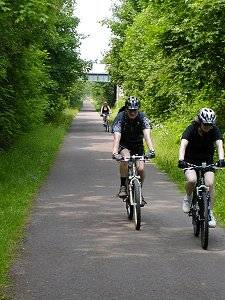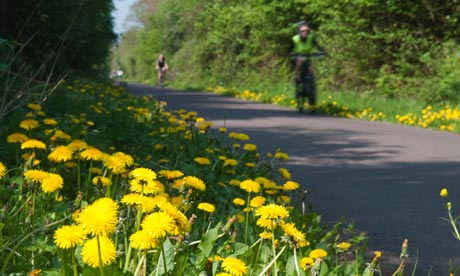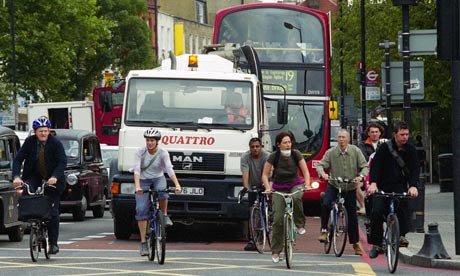Calling on government to create child-friendly communities
by Malcolm Shepherd, 26 April 2013
Westminster can be a stern place, but it
was made a lot brighter this morning! It was great fun to join TV presenter
Miranda Krestovnikoff and pupils... [see report below]
by Jason Torrance, 24 April 2013
Today saw the publication of two landmark
reports on cycling and physical activity. Both provide a unique opportunity for
the world of cycling and...
by Ben Addy, 17 March
2013
I remember the journey to school as plain
fun – an adventure at the start of every day. My trip to school was a fifteen
minute walk during which my...
by German Dector-Vega, 18 March 2013
The Mayor of London's proposal to only
allow zero and low-emission vehicles into Central London is an exciting idea
that has the potential to change...
10,617 people demand safer roads for children
26 April 2013
Prime Minister David Cameron has today received a petition signed
by more than 10,000 concerned parents, calling on the government to
make roads safer for children, as part of charity Sustrans’ Free Range
Kids campaign.
Sustrans’ Chief Executive, Malcolm Shepherd joined One Show presenter Miranda Krestovnikoff and two pupils from Westminster Cathedral School to hand in the petition to Downing Street.
Britain continues to have one of the worst road safety records in Europe for child pedestrians.
The Free Range Kids campaign called for the introduction of 20mph speed limits in residential areas and increased investment in safe routes to make it easier for young people to walk and cycle around their local area.
Malcolm Shepherd Sustrans’ Chief Executive said:
“People long for the days when the streets were filled with kids playing and we all had the opportunity to walk and cycle to school.
“Our streets should be safe, pleasant places where people can socialise, kids can play and where we all can spend time outside the four walls of our home.
“We need slower speed limits and safer walking and cycling routes so our kids can travel to school by bike or on foot and start to build healthy habits for a lifetime.”
Sustrans calls for full implementation of MPs’ 'Get Britain Cycling' report
24 April 2013
Sustrans’ Chief Executive, Malcolm Shepherd joined One Show presenter Miranda Krestovnikoff and two pupils from Westminster Cathedral School to hand in the petition to Downing Street.
Britain continues to have one of the worst road safety records in Europe for child pedestrians.
The Free Range Kids campaign called for the introduction of 20mph speed limits in residential areas and increased investment in safe routes to make it easier for young people to walk and cycle around their local area.
Malcolm Shepherd Sustrans’ Chief Executive said:
“People long for the days when the streets were filled with kids playing and we all had the opportunity to walk and cycle to school.
“Our streets should be safe, pleasant places where people can socialise, kids can play and where we all can spend time outside the four walls of our home.
“We need slower speed limits and safer walking and cycling routes so our kids can travel to school by bike or on foot and start to build healthy habits for a lifetime.”
Sustrans calls for full implementation of MPs’ 'Get Britain Cycling' report
24 April 2013
Responding to the publication of the All-Party Parliamentary Group on Cycling’s report, Get Britain Cycling, Sustrans’ Policy Director, Jason Torrance, said:
“The urgent action needed to Get Britain Cycling and the remarkable benefits of doing so are now clearer than ever.
“We now need leadership from the heart of government and co-operation by every department to implement these recommendations in full, helping to create a healthier, happier, more prosperous nation.
“Simple steps like putting cycling in the national curricula and fully considering bikes in planning decisions are vital to making sure people of all ages can cycle with confidence to work and the shops or to socialise.”
The report is available for download at http://allpartycycling.org
Sustrans | Join the movement
“We now need leadership from the heart of government and co-operation by every department to implement these recommendations in full, helping to create a healthier, happier, more prosperous nation.
“Simple steps like putting cycling in the national curricula and fully considering bikes in planning decisions are vital to making sure people of all ages can cycle with confidence to work and the shops or to socialise.”
The report is available for download at http://allpartycycling.org
Sustrans | Join the movement
.
.













